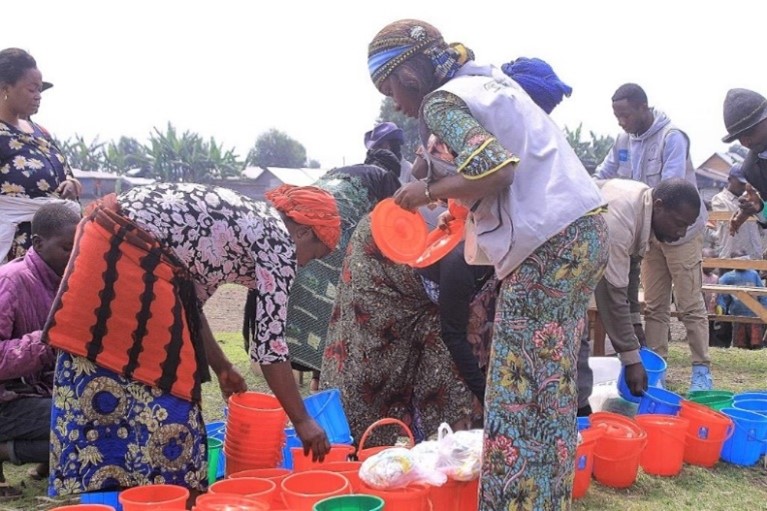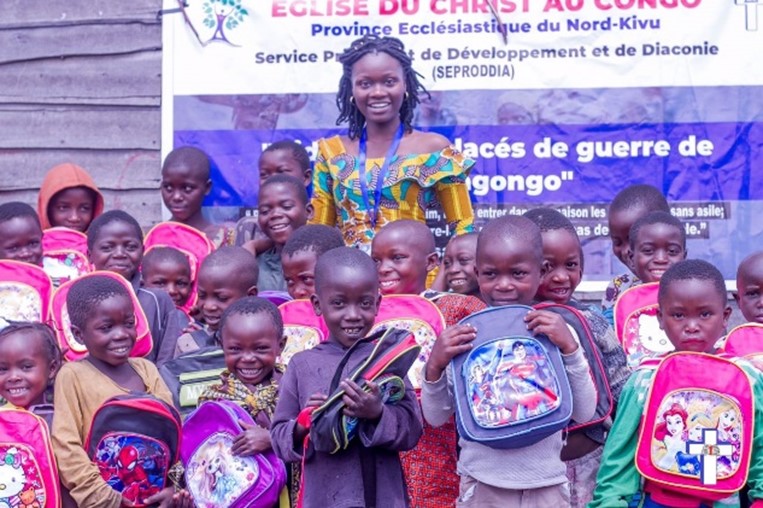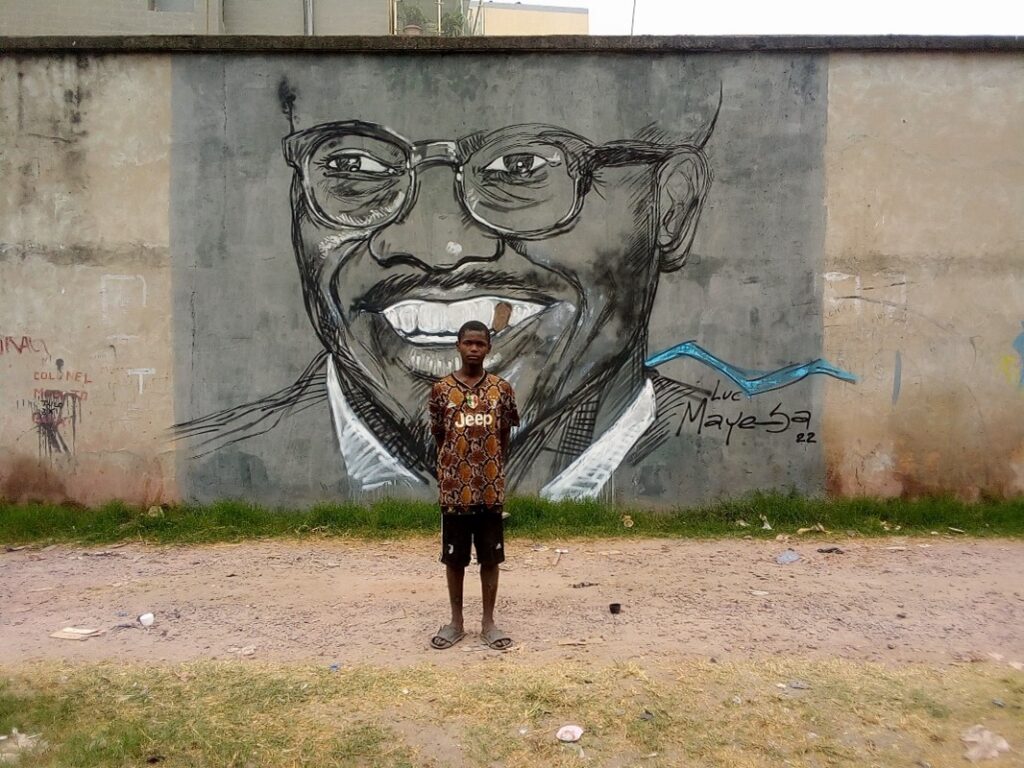The Incredible Riches of Congo
Bryan Parrish serves with the Church of Christ in Congo.
Praise be to the God and Father of our Lord Jesus Christ, the Father of compassion and the God of all comfort, who comforts us in all our troubles so that we can comfort those in any trouble with the comfort we ourselves receive from God. 2 Corinthians 1:3-4
Dear Friends in Christ,

Last August, I went for the first time to Goma, in the East of the Democratic Republic of Congo. I have already written you about the complicated situation and the strife and suffering of the population in this region. Not only did they suffer from the eruption of a volcano last year, but recent attacks from rebels from Rwanda have also left thousands without shelter and the bare minimum to survive. This comes after more than 25 years of massacres in this part of the country.
The incredible riches of the Congo’s natural resources have fueled endless conflicts. The neighboring countries have engaged in wars and used rebel groups to become rich, whereas the Congolese population remains extremely poor.
The World Bank has just listed DR Congo as one of the top five nations with the largest number of persons who live in poverty. 69,7% of the population lives on less than 1.90 $ a day. When you are reminded of the gold, diamonds, copper, oil, cobalt, coltan, and so many other minerals too many to name in Congo, it is just a scandal to imagine a population so destitute.
In the last weeks, three more cities have been taken by the M23 rebels with the help of the Rwandese army: Bunagana, Kiwanja, and Rusthuru center. After more than six months of new massacres and more than 25 years of aggression, the international community has finally condemned Rwanda for the aggression. The United Nations, the African Union, the European Union, and the United States have all said that Rwanda should stop helping the rebels and killing the Congolese population. The condemnations are fairly weak without a mention of possible sanctions. When you take into consideration the economic equation and the investments that have been made especially by the United States and Great Britain in Rwanda (where cobalt and coltan are not found !!), it is not surprising that the aggressions helped by the Rwandese government are pretty much ignored.
More than 20000 more persons have fled their homes in the last week to Goma to try to find shelter and protection to add to more than 200000 who are already victims of the atrocities. The churches and the schools serve as shelters for the most fortunate. Others sleep outside under the stars.

The Protestant Service for Development and Diaconia (SEPRODDIA) has been working with the ECC in North Kivu to bring assistance and support to the families that are the most in danger. With help from Global Ministries, the United Church of Canada, and the Church of God in Christ, we have been able to distribute food, water, clothing, and tarps to families. The amazing team in North Kivu also provided school supplies to the children and worked with the local schools to allow them to attend.
I will be going back to Goma next week to help the team in the distribution and to support their courageous efforts. Of course, our efforts do not resolve the fundamental problem for the population in the region. It is important that the Church find ways to show compassion and love in an ocean of misery.
In the context of struggle and suffering which is dominant in DC Congo at this time, I thought it might be interesting to share just a little bit of history.
Independence Day was celebrated last June 30th in DR Congo, 62 years since the end of colonialism. The 60th anniversary was stifled with COVID and 62 is not a round figure, but the anniversary this year was special. After 61 years, the Belgium government allowed the remains of Patrice Lumumba to be returned to the Democratic Republic of Congo.
Some might not know Patrice Lumumba. He was the first Prime Minister of DR Congo and led the struggle for independence. Patrice Lumumba gave a famous speech on the 30th of June 1960 in front of the King Baudouin of Belgium, the son of Leopold II, and other dignitaries. Let’s just say that his intention was not the thank the oppressors. He reminded his audience of the atrocities committed under colonialism and invited the Congolese population to form a united republic.
“[…] For this independence of the Congo, although being proclaimed today by agreement with Belgium, an amicable country, with which we are on equal terms, no Congolese worthy of the name will ever be able to forget that it was by fighting that it has been won, a day-to-day fight, an ardent and idealistic fight, a fight in which we were spared neither privation nor suffering, and for which we gave our strength and our blood. We are proud of this struggle, of tears, of fire, and of blood, to the depths of our being, for it was noble and just struggle, and indispensable to put an end to the humiliating slavery which was imposed upon us by force. […] »

Patrice Lumumba was Prime Minister for only about three months. He was faced with a mutiny (helped by the Belgium Government) of the region of Katanga, very rich in minerals and the exode of the Belgium population who had controlled all of the positions in the administration. In a short amount of time, he managed to lay the foundations of a Congolese Central Bank and reform the army, and start a brand-new administration. The quest for unity was his biggest accomplishment. This is of course not an easy task with an enormous country in surface and population and a mosaic of languages and tribes (French, Lingala Tshiluba, Kikongo, and Swahili are official languages with more than 200 other languages and dialects, and 436 tribes).
I will not give all the details, but after asking for help from the United States and the United Nations for help to quelch the separation movement of Katanga, Lumumba also asked for support from the Soviet Union. Patrice Lumumba was not a communist, but an African nationalist who wanted a united Congo and for the Congolese population to benefit from the rich natural resources of the country.
In the context of the Cold War, this decision proved fatal. He was chased from power in September 1960 on the 17th of January 1961 was assassinated.
There is little mystery that Lumumba was assassinated by the Belgium government with help from the CIA and the future dictator Mobutu who was named Secretary of State by Lumumba and had taken control of the army.
The “remains” of Patrice Lumumba are limited to just a tooth. That’s right. A tooth. A Belgium police officer stole it, probably for a gold filling. The rest of Patrice Lumumba was dissolved in acid to not leave a trace or a possible burial site to be created.
For several months, Patrice Lumumba’s tooth was displayed in the biggest cities in Congo. I must admit that I found something surrealistic about the ceremonies with a tooth. It is understandable in the context of Congo where the population needs heroes. When I go to work each morning, I pass by a mural painting of Patrice Lumumba in my neighborhood, without his tooth.
Patrice Lumumba was a charismatic leader, poet, and also Protestant Christian who led the struggle for justice in his country.
Christian faith inevitably inspires seeking justice and so many cries for justice come from those who live by their Christian faith.
“Without justice, there is no dignity. Without dignity, there is no freedom… » was one of his many memorable quotes.
A letter to his wife just after he was captured and taken to be assassinated is very moving.
Here is a little part of it :
“Neither brutality, nor abuse, nor torture has ever led me to ask for mercy because I would rather die with my head held high, with unshakable faith and deep confidence in the destiny of my country than to live in submission and contempt for sacred principles. History will one day say its word, but it will not be the history that will be taught at the United Nations, in Washington, Paris, or Brussels, but the history that will be taught in countries freed from colonialism and its puppets. Africa will write its own history and it will be from north to south of the Sahara a history of glory and dignity.”
Amen !
Bryan Parrish serves with the Church of Christ in Congo. His appointment is made possible by gifts to the Disciples Mission Fund, Our Church’s Wider Mission, and your special gifts.
